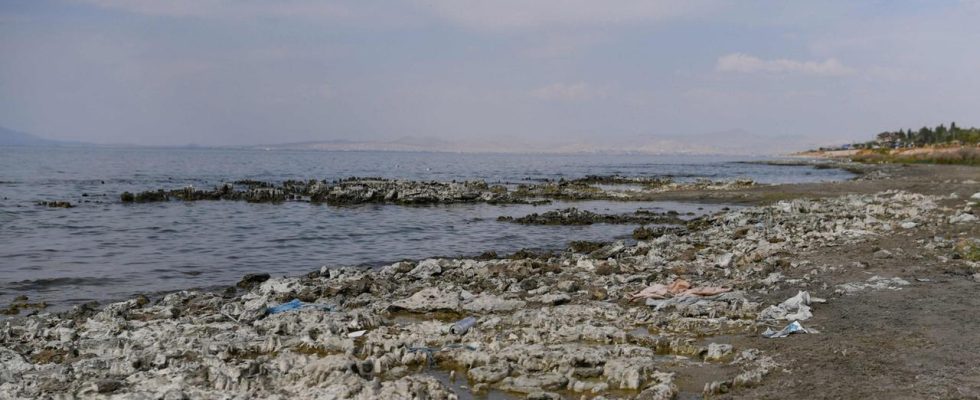Lake Van in eastern Turkey is a unique ecosystem. But that is in danger – from climate change, intensive agriculture and pollution. An action plan should help.
Lake Van is the largest lake in Türkiye. It is very popular with tourists who want to enjoy the unique nature there. But climate change is also hitting here. The lake is shrinking dramatically. Like much of the country, the area is suffering from persistent drought. Scientists fear the problems could get worse as Lake Van continues to dry up with the heatwave.
Biggest lake in Türkiye
Lake Van is about 3,700 square kilometers in size and up to 450 meters deep. Its surface has shrunk by around 1.5 percent in recent years. Scientists say that’s a lot. They blame the ongoing water loss on rising temperatures, which lead to less precipitation and excessive evaporation.
Almost three times as much water evaporates from the lake than comes back from the rain. The problem is now so severe that authorities are telling local farmers not to grow crops that require too much water. In addition, shepherds are finding less and less water for their cattle.
The water of Lake Van in Turkey has receded by almost four kilometers in some places.
Experts sound the alarm
The lake is burdened by pollution, drought, lack of precipitation and evaporation. This has reached alarming proportions. Precipitation decreased by about 20 percent in the spring. Mustafa Akkuş, a lecturer at the Faculty of Fisheries at Yücüncü Gil University of Van, closely follows the water resources in the Van Lake Basin. The history of the region is characterized by droughts.
According to Akkuş, there is no external water supply for Lake Van. The body of water is a closed basin. This makes it the largest so-called soda lake in the world, with no inflow or outflow and with an unusually high pH value and high salt content at the same time. Since Lake Van loses three to four times more water due to lack of precipitation in winter and high evaporation in summer, Akkuş draws attention to water management.
“We don’t have effective water management. The cultivated areas around the rivers near Lake Van are increasing every year. So the need for water is increasing every year. But the water is becoming scarcer every year.” So the intensive irrigation of agriculture is It’s a big problem, the scientist warns.
An environmentalist with the carcasses of starved seagulls. The van carp, which is endemic to Lake Van and is the main food of seagulls, began its migration earlier this year due to the falling water level. According to scientists, the Van carp is the only fish that lives in Lake Van.
Heavy contamination
Experts are also worried about increasing pollution, because the sewage from more than a million people flows – often unfiltered – into Lake Van. To some extent, every lake can absorb pollution. At Lake Van, however, this limit has already been far exceeded.
Probably the only solution: the sewage treatment plants must be operated at full capacity. However, this often fails due to the high costs. But that is a shame for yourself, because the lake and the surrounding natural areas are the basis of life for tens of thousands of people, especially in agriculture and animal husbandry. Furthermore, Lake Van is an important tourism magnet. Experts now fear that the changes in the region could lead to an economic upheaval and a strong emigration.
Historical treasures are uncovered
The decline in lake water does not only have disadvantages: Hidden historical treasures suddenly come to light. For example, dozens of rock-cut caves believed to date from the Urartu period (9th-6th centuries BC). Many local residents are now demanding that these finds be cataloged by the authorities and then released for tourism. This could give the remote region an economic boost and give many people here in economically troubled Turkey new prospects.
Government decides on rescue measures
Politicians are alarmed by the impending environmental catastrophe. An action plan to protect the lake should bring help. The project has already started with the construction of a biological sewage treatment plant. Now there should be improvements in the areas of sewage disposal, soil sludge cleaning and waste disposal. Apparently that’s a matter for the boss now. The wife of Turkish President Emine Erdoğan recently informed herself on site. Present: Yücel Yılmaz, President of the Union of Municipalities of Turkey (UMT), and Gülşen Orhan, Chief Advisor to the President.
First results: So far, a total of well over a million cubic meters of sludge is said to have been removed during the basic sludge cleaning process. However, it is unclear whether these measures will be sufficient in the long term to preserve the unique ecosystem of Lake Van in times of climate change.

